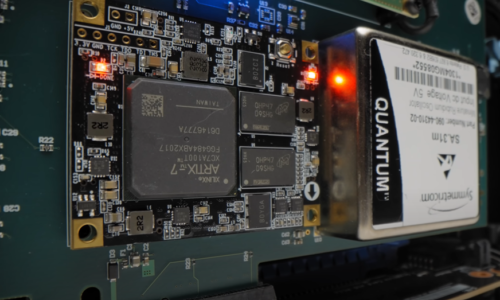Recently our blogs have been focusing on showcasing the great services we supply at Octagon and have bundled into our 365R services – see this web site Octagon’s 365R if you want to read more about that.
I have a memo here that says I should be writing about anti-virus software, but sometimes being the boss has its advantages – I can ignore the memo and write about something else that interests me.
It will come as no surprise to regular readers here that I like technology – here are just a couple of examples:
Where’s my flying car? – Octagon Technology
Where’s my flying car? The Sequel – Octagon Technology
Technology and Bring Your Own Device – Octagon Technology
This Story Just Won’t Go Away… – Octagon Technology
So when I saw this article on Linus Tech Tips – Why is this PCIe Card RADIOACTIVE? – I had to share it. For the full story you should go watch the video but I will mention here some of the nerdy things that got me excited.
The reason the card is radioactive is that it is an atomic clock made for installing in a computer so really accurate timing and synchronisation can be achieved. Today nearly every computer, smartphone and device does not need manual clock setting, it self sets and corrects using an internet service called NTP – Network Time Protocol – Wikipedia. Now you would think that all our devices will use the same time (adjusted for time zones) but this is not the case, there are errors of a few milliseconds everywhere. The simplified reason for this is that since NTP was introduced in the 1980s, computing devices have become much quicker and the internet (physical size and users on it) has expanded exponentially. So what, you may ask, a few milliseconds cannot make that much difference?
Well it can, for all sorts of applications, from playing online games with players on the other side of the world to watching live broadcast TV. Every packet of information that is passed over the internet, implementing the services we all use, has a time stamp on it, and for the internet to work properly and ensure that the information we all receive is correct, these time stamps have to agree. A difference can mean that packets received by a system could conceivably come in with a timestamp showing that they have come from the future – not time travel just a time error and a resulting communications mess. This is an issue for the big networks, Google, Facebook etc – Facebook’s fix was to simply add a 20 millisecond delay to all packets, to ensure nothing came from the future.
Because this was an issue for Facebook they have helped develop this open source nanosecond (much smaller than a millisecond) accurate computer-based clock to help create a more efficient and secure internet.
Really accurate times will improve online gaming, stock trading, broadcasting and even the maintenance of the physical structure of the internet but it will also help with security. Being able to predict accurately the time it takes for data to travel over a network, for instance, will enable the detection of such attacks as man-in-the-middle where bad actors manipulate data enroute.
I am only mentioning the highlights here, go and watch the video, I promise you it is interesting even if you are not nerdy!
Next – why you need a really good anti-virus solution rather than one that just works…
Update September 2021:
Here is an example of accurate time and security:
Time and security – Smart Thinking Solutions
Clive Catton MSc (Cyber Security)
Clive is the CIO at Octagon Technology with special responsibility for data privacy and security. The world of business technology is constantly changing and to meet this challenge he recently graduated from Edinburgh Napier University with an MSc in Advanced Computer Security and Digital Forensics. His dissertation was on data privacy in small businesses using Microsoft 365 for business.
The degree is not the end of the studying – to keep current Clive spends some of his time at work simply reading and studying the latest technology trends and threats so our clients can benefit from this knowledge. This knowledge also shapes and supports the products and services our people deliver to clients.
To make full use of Clive’s new Master’s degree in Computer Security, Clive and Diana have a joint venture with an international research company to get access for our clients to up to date information, schemas, analytics, templates, actionable tools and guidance. Whatever the size of your organisation if you are not approaching IT, security and privacy in a way that supports and benefits you, they can help, from the boardroom to the shop floor.
If you would like to discuss any of these matters with Clive, email me at kamila@octagontech.com and I will organise a video meeting for you. He will be happy to answer questions about your particular issues.
Kamila (General Manager)
Image – Linus Tech Tips video


